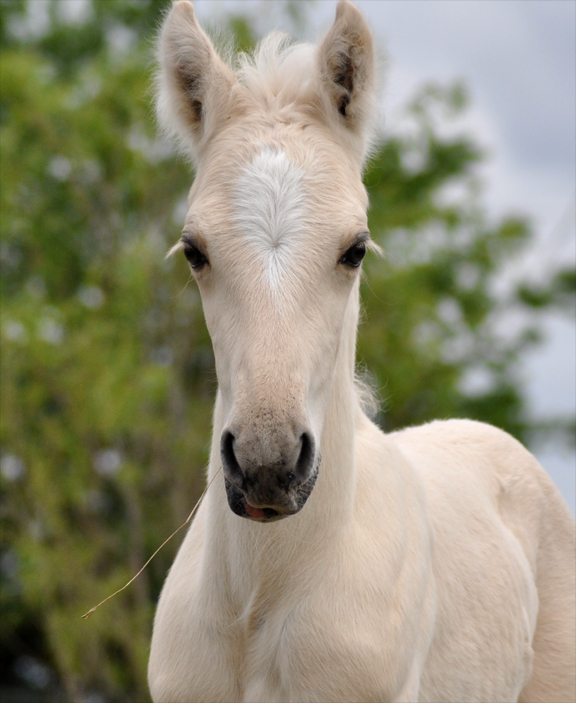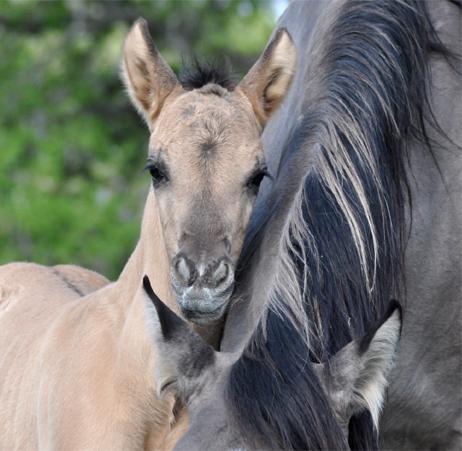Email: kigers@ranchobayo.com
rancho bayo © 2012 located in central texas usa 512.868.7638
Double click here to edit this text.
Over the last decade or so, a form of "training" a newborn foal has become very popular. Over the years, we have done some imprinting and worked with many horses that had been imprinted.
Imprinting involves holding the foal down right after birth, touching it all over, violating every orifice and exposing it to scary things such as plastic bags and even clippers. Talk about sensory overload!
The foal cannot possibly process all that information in any useful way. If it takes people two-thousand repetitions for something to become ingrained - forcing a restrained foal to experience otherwise scary situations is just plain silly. Imprinting is a way of desensitizing the young foal. You run the risk of taking all the God-given sense right out of him - leaving him with no sense at all!
At birth, even though a foals' senses may be "developed", they are very immature senses. The foals' only focus is to get up, get those legs working and strong so they can nurse that much needed colostrum and bond with their momma. All of these things are needed for survival and for the proper development of the foal. Getting in the way of that can only be detrimental to their proper development as a HORSE. Imprinting may be beneficial if you want a pet, but then you are running the risk of over-gentling them and making them spoiled.
Imprinting involves holding the foal down right after birth, touching it all over, violating every orifice and exposing it to scary things such as plastic bags and even clippers. Talk about sensory overload!
The foal cannot possibly process all that information in any useful way. If it takes people two-thousand repetitions for something to become ingrained - forcing a restrained foal to experience otherwise scary situations is just plain silly. Imprinting is a way of desensitizing the young foal. You run the risk of taking all the God-given sense right out of him - leaving him with no sense at all!
At birth, even though a foals' senses may be "developed", they are very immature senses. The foals' only focus is to get up, get those legs working and strong so they can nurse that much needed colostrum and bond with their momma. All of these things are needed for survival and for the proper development of the foal. Getting in the way of that can only be detrimental to their proper development as a HORSE. Imprinting may be beneficial if you want a pet, but then you are running the risk of over-gentling them and making them spoiled.

If you have ever been around a young foal, you know that they are pretty much "out to lunch" the first few days of life. They are taking everything in and experiencing it for the first time and this is best done slowly so they can learn and not become overloaded and distracted easily. Every foal develops differently, just like children, and their lessons and experiences need to be given at the proper times. Here again, preparation is the key, and in order for that foal to be successful his whole life, he needs to be prepared for each step along the way.
There are a few things you can accomplish with imprinting, such as learned helplessness. You can quickly teach a young foal to give up and take whatever abuse is given to them later in life. This will definitely help your vet and farrier or anyone else that does not take the time to teach the horse something, rather than force it upon him.
There are a few things you can accomplish with imprinting, such as learned helplessness. You can quickly teach a young foal to give up and take whatever abuse is given to them later in life. This will definitely help your vet and farrier or anyone else that does not take the time to teach the horse something, rather than force it upon him.


You can also show him to put his natural instincts aside and be a quitter. That way he does not have to figure things out for himself and when you ride him, you can totally control and dominate his every move. I suppose this does not sound so bad to some people, but taking into consideration the nature of the horse, it is pretty dismal.
There are many versions of imprinting and I am sure lots of people have what they deem as success. I have seen (and tried to train) just as many that were not so "successful" and they are monsters. A lot of people like to do the gentling part, and not the dominate part - thinking they could just do that later. Well, 500 lbs later, later never comes until the trainer gets them!
We have found that the foals' tell us when they are ready for their lessons. We do not force things upon them and stay in tune with their development as best we can. They go through many stages and one thing that always is consistent, is they always come around and want attention, affection and leadership sooner or later.
This is another benefit of being able to raise and take care of our foals until they are mature enough to start under saddle. We leave nothing up to chance, or a new owner that may not be educated in handling and training young horses. We try our best to set our horses up for a successful life.
There are many versions of imprinting and I am sure lots of people have what they deem as success. I have seen (and tried to train) just as many that were not so "successful" and they are monsters. A lot of people like to do the gentling part, and not the dominate part - thinking they could just do that later. Well, 500 lbs later, later never comes until the trainer gets them!
We have found that the foals' tell us when they are ready for their lessons. We do not force things upon them and stay in tune with their development as best we can. They go through many stages and one thing that always is consistent, is they always come around and want attention, affection and leadership sooner or later.
This is another benefit of being able to raise and take care of our foals until they are mature enough to start under saddle. We leave nothing up to chance, or a new owner that may not be educated in handling and training young horses. We try our best to set our horses up for a successful life.
